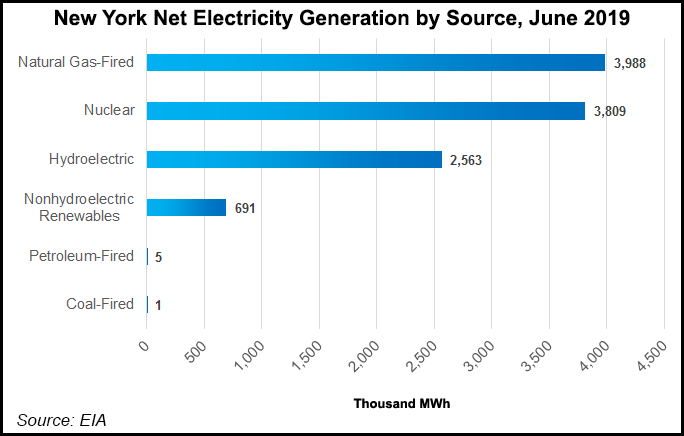Regulatory | NGI All News Access | NGI The Weekly Gas Market Report
New York Carbon Pricing Proposal Forecast to Cut State’s Natural Gas Use Further
The New York Independent System Operator’s (NYISO) carbon pricing proposal could help the state achieve its climate goals faster and more effectively, while also further reducing the use of natural gas, according to a report by the Analysis Group.

The international consultancy prepared the report for NYISO. The grid operator has for years been at work on the proposal, which if implemented would be the first of its kind in the country for a competitive wholesale electricity market.
A carbon price would accelerate the entry of alternative energy projects into the market, help the state achieve its goals at a lower cost through market efficiencies and investments in alternative energy technologies that result from the policy and help create incentives for carbon-reducing innovation, according to the report.
At the same time, a carbon tax would “put financial pressure” on existing inefficient fossil fuel units to retire, the Analysis Group said. It would also reduce the use of fossil fuels, including natural gas, particularly in the downstate region and drive increased efficiencies among remaining fossil fuel generation facilities.
“Reaching the state’s decarbonization goals will require all parties working together closely with every solution available,” said NYISO CEO Rich Dewey. “Competitive electric markets are a strong and proven platform from which to leverage innovation, and we look forward to collaborating with the state on the exciting and important work ahead.”
Under legislation passed earlier this year, New York is targeting an 85% cut in greenhouse gas (GHG) emissions below 1990 levels by 2050. It’s also aiming to offset another 15% with the ultimate goal of creating a net-zero emission economy. The law also requires the state to generate 70% of its electricity from renewable sources such as wind and solar by 2030 and obtain 100% of its electricity from renewables by 2040.
New York continues to depend on gas for a variety of purposes, with most of it burned in buildings. In the power sector last year, 41% of in-state generation came from power plants that predominantly burn natural gas, according to the Analysis Group.
Depending on a variety of factors, statewide gas use in the power sector would drop anywhere from 2.4% to 7.8% if a carbon price is implemented, according to the Analysis Group’s review of previous studies that examined the possible effects in 2022, 2025 and 2030.
Using less gas in the power sector, the report added, would lower GHG emissions and reduce reliance on the fuel as the state has resisted new infrastructure. The report also said a carbon price could hasten the reduction of natural gas in other sectors. Due to a lack of supplies, some utilities have been forced to impose moratoriums on new gas service.
Under NYISO’s proposal, the grid operator would incorporate the so-called social cost of carbon emissions into the state’s wholesale energy markets using a carbon price in dollars per ton of carbon dioxide (CO2) emissions. NYISO would apply the carbon price by debiting each supplier a charge for its carbon emissions at the specified price. Suppliers would embed these additional carbon charges in their offers into the power market, incorporating the price into the unit commitment, dispatch and price formation through NYISO’s existing processes.
The carbon price would be based on the social cost of carbon emissions, which is to be established by New York state. Imports of power into New York would also include a carbon price, to discourage leakage of CO2 emissions from neighboring regions.
Consumers would see a portion of the carbon charges collected from generators returned to them.
Analysis Group’s report is under review by NYISO stakeholders. Gov. Andrew Cuomo’s administration must ultimately sign off on carbon pricing. NYISO’s board and stakeholders, along with the Federal Energy Regulatory Commission, would also have to approve the proposal. At the earliest, NYISO said carbon pricing could be implemented by 2Q2021.
© 2024 Natural Gas Intelligence. All rights reserved.
ISSN © 1532-1231 | ISSN © 2577-9877 | ISSN © 1532-1266 |
